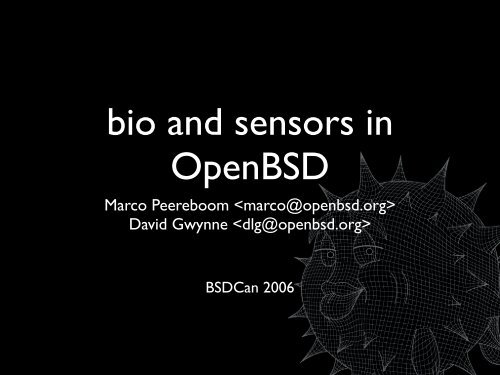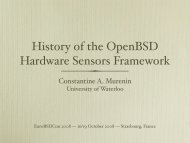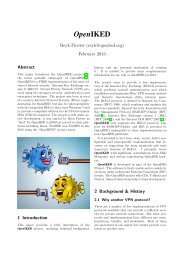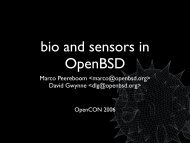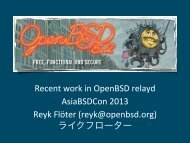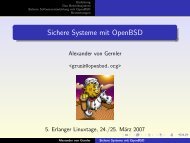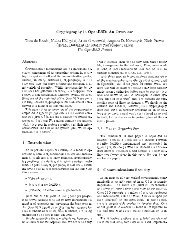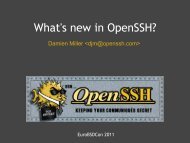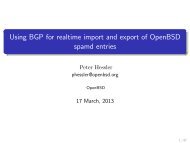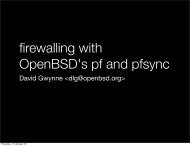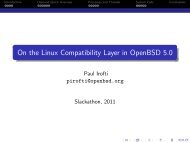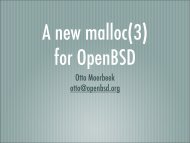Create successful ePaper yourself
Turn your PDF publications into a flip-book with our unique Google optimized e-Paper software.
io <strong>and</strong> <strong>sensors</strong> <strong>in</strong><br />
<strong>OpenBSD</strong><br />
Marco Peereboom <br />
David Gwynne <br />
BSDCan 2006
<strong>in</strong>troduction<br />
• what is RAID management?<br />
• what are <strong>sensors</strong>?<br />
• why do we care?<br />
• what's the problem?<br />
• what's the solution?
what is RAID management?<br />
• the ability to see the configuration of RAID<br />
sets<br />
• the ability to detect failures <strong>in</strong> RAID volumes<br />
<strong>and</strong> components<br />
• the ability to fix RAID sets<br />
• extra bits for people who like to push<br />
buttons
what are <strong>sensors</strong>?<br />
• <strong>sensors</strong> are anyth<strong>in</strong>g that provides<br />
environmental <strong>in</strong>formation about your system<br />
• anyth<strong>in</strong>g that can tell you about the status of<br />
your components, eg:<br />
• cpu temp <strong>and</strong> voltage<br />
• ambient temp<br />
• power supply redundancy
why do we care?<br />
• computers are now built with redundancy so<br />
they can withst<strong>and</strong> failures of their parts<br />
• environmental read<strong>in</strong>gs aid <strong>in</strong> predict<strong>in</strong>g<br />
potential future failures<br />
• we can replace the part or shutdown the<br />
mach<strong>in</strong>e before component failure or<br />
permanent damage to the mach<strong>in</strong>e
what's the problem?<br />
• every vendor implements tools to manage<br />
raid devices <strong>and</strong> <strong>sensors</strong> differently<br />
• these tools have evolved over the years <strong>in</strong>to<br />
extremely complex <strong>and</strong> brittle stacks<br />
• open source operat<strong>in</strong>g systems seem merely<br />
content to boot on the hardware <strong>and</strong> let the<br />
vendor provide the monitor<strong>in</strong>g<br />
• every implementation looks different
what's the solution?<br />
• take some responsibility <strong>and</strong> make our own<br />
• more specifically:<br />
• def<strong>in</strong>e your own stack <strong>and</strong> <strong>in</strong>terfaces<br />
• get the specification for the hardware so<br />
you can fit drivers <strong>in</strong>to the <strong>in</strong>terfaces<br />
• write the code<br />
• fly to canada to give a talk about it
<strong>sensors</strong> <strong>in</strong> depth<br />
• <strong>sensors</strong> are a stack made<br />
up of:<br />
• the hardware<br />
• the driver<br />
• the sensor framework<br />
• sysctl<br />
• all the smarts are <strong>in</strong> the<br />
sensor framework<br />
userl<strong>and</strong><br />
kernel<br />
sysctl<br />
sensor framework<br />
driver<br />
hardare
sensor hardware<br />
• we've found a lot of <strong>sensors</strong><br />
• SCSI enclosures: ses, safte<br />
• system management controllers: ipmi, esm<br />
• I2C <strong>and</strong> SMBus devices: adc, admcts, admlc,<br />
amdtemp, admtm, admtmp, admtt, adt,<br />
asbtm, asms, fcu, glenv, lmenv, lmtemp,<br />
maxds, maxtmp, pcfadc, tsl, ...
sensor drivers<br />
• the driver is responsible for retriev<strong>in</strong>g, <strong>in</strong>terpret<strong>in</strong>g,<br />
<strong>and</strong> normalis<strong>in</strong>g the sensor values off the hardware<br />
• the driver allocates a sensor struct, fills it <strong>in</strong>, <strong>and</strong> adds<br />
it to the sensor-framework<br />
• it periodically updates the sensor values <strong>and</strong> status<br />
• the driver can do its own updates<br />
• or if it needs process context (eg, to sleep or do<br />
DMA) it can register a task with the sensor<br />
framework
the sensor framework<br />
• ma<strong>in</strong>ta<strong>in</strong>s the list of <strong>sensors</strong> as drivers add <strong>and</strong><br />
remove entries<br />
• provides a s<strong>in</strong>gle place for sysctl to query all drivers<br />
• provides a s<strong>in</strong>gle kernel thread for all <strong>sensors</strong> to<br />
update out of via callbacks
sysctl<br />
• the sysctl <strong>in</strong>terface is where userl<strong>and</strong> <strong>and</strong><br />
kernel meet<br />
• when the kernel is queried it walks the list of<br />
<strong>sensors</strong> <strong>and</strong> copies the requested <strong>sensors</strong><br />
struct out to userl<strong>and</strong><br />
• decouples updates <strong>and</strong> userl<strong>and</strong> so reads will<br />
not block
<strong>sensors</strong> <strong>in</strong> userl<strong>and</strong><br />
• userl<strong>and</strong> gets the kernels sensor <strong>in</strong>formation<br />
via sysctl(3)<br />
• sysctl(8) fetches <strong>and</strong> translates this <strong>in</strong>fo <strong>in</strong>to<br />
human readable output<br />
• <strong>sensors</strong>d(8) tries to do someth<strong>in</strong>g smart with<br />
it
what a sensor looks like<br />
struct sensor {<br />
SLIST_ENTRY(sensor)<br />
<strong>in</strong>t<br />
char<br />
enum sensor_type<br />
char<br />
<strong>in</strong>t64_t<br />
u_<strong>in</strong>t<br />
enum sensor_status<br />
<strong>in</strong>t<br />
struct timeval<br />
};<br />
list;<br />
num;<br />
device[16];<br />
type;<br />
desc[32];<br />
value;<br />
rfact;<br />
status;<br />
flags;<br />
tv;
<strong>sensors</strong> <strong>in</strong> the kernel<br />
void<br />
void<br />
struct sensor<br />
<strong>in</strong>t<br />
void<br />
sensor_add(struct sensor *s);<br />
sensor_del(struct sensor *s);<br />
*sensor_get(<strong>in</strong>t id);<br />
sensor_task_register(void *arg,<br />
void (*func)(void *), <strong>in</strong>t period);<br />
sensor_task_unregister(void *arg);
<strong>sensors</strong> via sysctl(3)<br />
<strong>in</strong>t mib[] = { CTL_HW, HW_SENSORS, 0 };<br />
struct sensor s;<br />
size_t slen = sizeof(s);<br />
sysctl(mib, sizeof(mib)/sizeof(mib[0]), &s, &slen, NULL, 0);
<strong>sensors</strong> via sysctl(8)<br />
# sysctl hw.<strong>sensors</strong><br />
hw.<strong>sensors</strong>.0=ipmi0, Phys. Security, On, CRITICAL<br />
hw.<strong>sensors</strong>.1=ipmi0, Baseboard 1.5V, 1.51 V DC, OK<br />
hw.<strong>sensors</strong>.2=ipmi0, Baseboard 2.5V, 2.51 V DC, OK<br />
hw.<strong>sensors</strong>.3=ipmi0, Baseboard 3.3V, 3.34 V DC, OK<br />
hw.<strong>sensors</strong>.4=ipmi0, Baseboard 3.3Vsb, 3.49 V DC, OK<br />
hw.<strong>sensors</strong>.5=ipmi0, Baseboard 5V, 5.10 V DC, OK<br />
hw.<strong>sensors</strong>.6=ipmi0, Baseboard 12V, 12.10 V DC, OK<br />
hw.<strong>sensors</strong>.7=ipmi0, Baseboard -12V, -12.30 V DC, OK<br />
hw.<strong>sensors</strong>.8=ipmi0, Battery Voltage, 3.14 V DC, OK<br />
hw.<strong>sensors</strong>.9=ipmi0, Processor VRM, 1.47 V DC, OK<br />
hw.<strong>sensors</strong>.10=ipmi0, Baseboard Temp, 30.00 degC, OK<br />
hw.<strong>sensors</strong>.11=ipmi0, Processor 1 Temp, 36.00 degC, OK<br />
hw.<strong>sensors</strong>.13=ipmi0, Baseboard Fan 1, 1980 RPM, OK<br />
hw.<strong>sensors</strong>.14=ipmi0, Baseboard Fan 2, 2100 RPM, OK<br />
...
<strong>sensors</strong>d<br />
• <strong>sensors</strong>d polls the sensor values by<br />
periodically retriev<strong>in</strong>g them via sysctl<br />
• <strong>sensors</strong>d can react upon threshold values as<br />
configured <strong>in</strong> /etc/<strong>sensors</strong>d.conf, eg, if the<br />
ambient temperature value exceeds 70 degC<br />
then page the adm<strong>in</strong>istrator<br />
• currently awful, it is be<strong>in</strong>g rewritten
<strong>sensors</strong> summary<br />
• <strong>sensors</strong> are not magical, they're generally very<br />
simple, ie, read a value off hardware <strong>and</strong> stash<br />
it <strong>in</strong> a struct<br />
• the same framework is enabled on all our<br />
archs (cept zaurus maybe)<br />
• <strong>sensors</strong> are easy (<strong>and</strong> fun, like bl<strong>in</strong>kenlights)<br />
to implement <strong>and</strong> use
RAID management<br />
• similar to <strong>sensors</strong> <strong>in</strong> that we want to see the<br />
status of redundant components<br />
• different to <strong>sensors</strong> <strong>in</strong> that we need to do<br />
more, eg, replace disks <strong>and</strong> add spares<br />
• hard to do because vendors don't want to<br />
give up documentation<br />
• vendors do provide tools, but...
vendor tools<br />
• b<strong>in</strong>ary only, <strong>and</strong> limited to specific archs<br />
• requires us to open big holes <strong>in</strong> the kernel<br />
for userl<strong>and</strong> to talk directly to the hardware<br />
(<strong>and</strong> hasn't that worked so well for X?)<br />
• provided under <strong>in</strong>compatible licenses, so can't<br />
be shipped <strong>in</strong> the base system<br />
• therefore not supported on <strong>OpenBSD</strong>
RAID documentation<br />
• attempts to obta<strong>in</strong> documentation have failed<br />
for several reasons<br />
• Vendors do not posses current <strong>and</strong><br />
accurate documentation<br />
• Vendors do not want to support a product<br />
beyond regular channels<br />
• Vendors th<strong>in</strong>k their hardware is special
typical RAID management<br />
stack<br />
• typically developed by<br />
different teams result<strong>in</strong>g <strong>in</strong><br />
large amounts of<br />
abstraction<br />
• the abstraction leads to<br />
bugs (more code always<br />
has more places for bugs<br />
to hide)<br />
• different vendors have<br />
their own stacks<br />
GUI<br />
Agent<br />
Library<br />
Driver<br />
Firmware
RAID management essentials<br />
• production mach<strong>in</strong>es do not need complex<br />
tool cha<strong>in</strong>s for RAID management. They<br />
essentially only need the follow<strong>in</strong>g feature set:<br />
• alerts<br />
• monitor<strong>in</strong>g<br />
• <strong>in</strong>quiry<br />
• recovery operations
<strong>OpenBSD</strong> RAID management<br />
<strong>bio</strong>ctl<br />
<strong>bio</strong>(4)<br />
<strong>sensors</strong><br />
Inquiry<br />
&<br />
Recovery<br />
Driver<br />
Firmware<br />
Alert<strong>in</strong>g<br />
&<br />
Monitor<strong>in</strong>g
io(4)<br />
• technically it is a pseudo device that tunnels<br />
ioctls for devices that don't have their own<br />
/dev entry<br />
• drivers have to register with <strong>bio</strong> to be<br />
accessible via <strong>bio</strong><br />
• we def<strong>in</strong>e some ioctls that raid controllers<br />
can implement that is accessable via <strong>bio</strong>
io <strong>in</strong>side drivers<br />
• In order to support <strong>bio</strong> drivers need to<br />
support some of the follow<strong>in</strong>g ioctls:<br />
• BIOCINQ, BIOCDISK, BIOCVOL for<br />
enumeration of volumes <strong>and</strong> disks<br />
• BIOCSETSTATE for add<strong>in</strong>g spares<br />
• BIOCALARM, BIOCBLINK for f<strong>in</strong>d<strong>in</strong>g the<br />
computer <strong>and</strong> the disks<br />
• need a pass thru bus for access to phys bus
ioctl<br />
• <strong>bio</strong>ctl is the userl<strong>and</strong> half of our RAID<br />
management tool<br />
• <strong>in</strong>tended as the ifconfig of RAID controllers<br />
• it translates the <strong>bio</strong> ioctls <strong>in</strong>to someth<strong>in</strong>g<br />
humans can grok
ioctl<br />
• <strong>in</strong>quiry functions:<br />
• display RAID setup <strong>and</strong> status<br />
• bl<strong>in</strong>k enclosure slot so you can f<strong>in</strong>d it<br />
• recovery functions:<br />
• alarm management<br />
• create hot-spare<br />
• rebuild to hot-spare
ioctl <strong>in</strong> action<br />
# <strong>bio</strong>ctl ami0<br />
Volume Status Size Device<br />
ami0 0 Onl<strong>in</strong>e 366372454400 sd0 RAID5<br />
0 Onl<strong>in</strong>e 73403465728 0:0.0 ses0 <br />
1 Onl<strong>in</strong>e 73403465728 0:2.0 ses0 <br />
2 Onl<strong>in</strong>e 73403465728 0:4.0 ses0 <br />
3 Onl<strong>in</strong>e 73403465728 0:8.0 ses0 <br />
4 Onl<strong>in</strong>e 73403465728 1:10.0 ses1 <br />
5 Onl<strong>in</strong>e 73403465728 1:12.0 ses1 <br />
ami0 1 Onl<strong>in</strong>e 366372454400 sd1 RAID5<br />
0 Onl<strong>in</strong>e 73403465728 0:1.0 ses0 <br />
1 Onl<strong>in</strong>e 73403465728 0:3.0 ses0 <br />
2 Onl<strong>in</strong>e 73403465728 0:5.0 ses0 <br />
3 Onl<strong>in</strong>e 73403465728 1:9.0 ses1 <br />
4 Onl<strong>in</strong>e 73403465728 1:11.0 ses1 <br />
5 Onl<strong>in</strong>e 73403465728 1:13.0 ses1 <br />
ami0 2 Unused 73403465728 1:14.0 ses1 <br />
ami0 3 Hot spare 73403465728 1:15.0 ses1
ioctl when we pull a disk<br />
# <strong>bio</strong>ctl ami0<br />
Volume Status Size Device<br />
ami0 0 Onl<strong>in</strong>e 366372454400 sd0 RAID5<br />
0 Onl<strong>in</strong>e 73403465728 0:0.0 ses0 <br />
1 Onl<strong>in</strong>e 73403465728 0:2.0 ses0 <br />
2 Onl<strong>in</strong>e 73403465728 0:4.0 ses0 <br />
3 Onl<strong>in</strong>e 73403465728 0:8.0 ses0 <br />
4 Onl<strong>in</strong>e 73403465728 1:10.0 ses1 <br />
5 Onl<strong>in</strong>e 73403465728 1:12.0 ses1 <br />
ami0 1 Degraded 366372454400 sd1 RAID5<br />
0 Onl<strong>in</strong>e 73403465728 0:1.0 ses0 <br />
1 Onl<strong>in</strong>e 73403465728 0:3.0 ses0 <br />
2 Onl<strong>in</strong>e 73403465728 0:5.0 ses0 <br />
3 Rebuild 73403465728 1:15.0 ses1 <br />
4 Onl<strong>in</strong>e 73403465728 1:11.0 ses1 <br />
5 Onl<strong>in</strong>e 73403465728 1:13.0 ses1 <br />
ami0 2 Unused 73403465728 1:14.0 ses1
ioctl when we return the disk<br />
# <strong>bio</strong>ctl ami0<br />
Volume Status Size Device<br />
ami0 0 Onl<strong>in</strong>e 366372454400 sd0 RAID5<br />
0 Onl<strong>in</strong>e 73403465728 0:0.0 ses0 <br />
1 Onl<strong>in</strong>e 73403465728 0:2.0 ses0 <br />
2 Onl<strong>in</strong>e 73403465728 0:4.0 ses0 <br />
3 Onl<strong>in</strong>e 73403465728 0:8.0 ses0 <br />
4 Onl<strong>in</strong>e 73403465728 1:10.0 ses1 <br />
5 Onl<strong>in</strong>e 73403465728 1:12.0 ses1 <br />
ami0 1 Degraded 366372454400 sd1 RAID5<br />
0 Onl<strong>in</strong>e 73403465728 0:1.0 ses0 <br />
1 Onl<strong>in</strong>e 73403465728 0:3.0 ses0 <br />
2 Onl<strong>in</strong>e 73403465728 0:5.0 ses0 <br />
3 Rebuild 73403465728 1:15.0 ses1 <br />
4 Onl<strong>in</strong>e 73403465728 1:11.0 ses1 <br />
5 Onl<strong>in</strong>e 73403465728 1:13.0 ses1 <br />
ami0 2 Unused 73403465728 1:9.0 ses1 <br />
ami0 3 Unused 73403465728 1:14.0 ses1
ioctl when we make it a spare<br />
# <strong>bio</strong>ctl -H 1:9 ami0<br />
# <strong>bio</strong>ctl ami0<br />
Volume Status Size Device<br />
ami0 0 Onl<strong>in</strong>e 366372454400 sd0 RAID5<br />
0 Onl<strong>in</strong>e 73403465728 0:0.0 ses0 <br />
1 Onl<strong>in</strong>e 73403465728 0:2.0 ses0 <br />
2 Onl<strong>in</strong>e 73403465728 0:4.0 ses0 <br />
3 Onl<strong>in</strong>e 73403465728 0:8.0 ses0 <br />
4 Onl<strong>in</strong>e 73403465728 1:10.0 ses1 <br />
5 Onl<strong>in</strong>e 73403465728 1:12.0 ses1 <br />
ami0 1 Degraded 366372454400 sd1 RAID5<br />
0 Onl<strong>in</strong>e 73403465728 0:1.0 ses0 <br />
1 Onl<strong>in</strong>e 73403465728 0:3.0 ses0 <br />
2 Onl<strong>in</strong>e 73403465728 0:5.0 ses0 <br />
3 Rebuild 73403465728 1:15.0 ses1 <br />
4 Onl<strong>in</strong>e 73403465728 1:11.0 ses1 <br />
5 Onl<strong>in</strong>e 73403465728 1:13.0 ses1 <br />
ami0 2 Hot spare 73403465728 1:9.0 ses1 <br />
ami0 3 Unused 73403465728 1:14.0 ses1
other <strong>bio</strong>ctl magic<br />
• help! i am bleed<strong>in</strong>g from the ears (or wak<strong>in</strong>g<br />
people up when test<strong>in</strong>g at 1am)!<br />
• Disable the alarm with:<br />
# <strong>bio</strong>ctl -a quiet ami0<br />
• help! show me the disk i need to replace!<br />
• Bl<strong>in</strong>k it with:<br />
# <strong>bio</strong>ctl -b 1.9 ami0
RAID <strong>and</strong> <strong>sensors</strong><br />
• along with temperatures <strong>and</strong> voltages, we<br />
have a type of sensor for report<strong>in</strong>g disk<br />
status<br />
• provides near realtime <strong>in</strong>formation on the<br />
health of a RAID disk:<br />
hw.<strong>sensors</strong>.0=sd0, ami0 0, drive onl<strong>in</strong>e, OK<br />
hw.<strong>sensors</strong>.1=sd1, ami0 1, drive onl<strong>in</strong>e, WARNING<br />
• raid disks can be monitored like all other hw
SES <strong>and</strong> SAF-TE<br />
• short for "SCSI Enclosure Services" <strong>and</strong> "SCSI<br />
Accessed Fault-Tolerant Arrays"<br />
• they're needed for one ma<strong>in</strong> reason<br />
• SCSI does not support hot-plug without<br />
either one of these devices. <strong>in</strong> the above<br />
example the <strong>in</strong>sertion of the disk <strong>in</strong> slot 1:9<br />
would go undetected without an enclosure<br />
• also provide normal temp/volt/etc <strong>sensors</strong>
supported hardware<br />
• most SCSI <strong>and</strong> SATA based LSI/AMI<br />
MegaRAID cards<br />
• older cards don't grok some of the<br />
MegaRAID <strong>in</strong>quiries we issue <strong>in</strong> the ioctls<br />
• could probably do better, but no docs<br />
• gdt(4) work has begun<br />
• SES, SAF-TE on the physical busses
conclusion<br />
• RAID isn't some arcane voodoo (no chickens<br />
were harmed <strong>in</strong> the development of this<br />
software), <strong>and</strong> <strong>sensors</strong> are not magical<br />
• only a small amount of functionality is<br />
necessary to create useful RAID management<br />
• if we can do it, so can you. allow<strong>in</strong>g vendors<br />
to provide their tools rather than doco is<br />
hurt<strong>in</strong>g users. imag<strong>in</strong>e ifconfig by vendors
i have a dream... (the future)<br />
• i plan to never travel through the USA aga<strong>in</strong><br />
• both <strong>sensors</strong> <strong>and</strong> <strong>bio</strong> are still new <strong>and</strong> are<br />
very much works <strong>in</strong> progress<br />
• for <strong>sensors</strong><br />
• a new <strong>sensors</strong>d with a hetero config file<br />
• <strong>sensors</strong> driven by userl<strong>and</strong><br />
• new sensor types <strong>and</strong> drivers for new hw
i have a dream... (the future)<br />
• for <strong>bio</strong><br />
• add support to other RAID cards: mpt, mfi,<br />
ciss for starters<br />
• S.M.A.R.T. support for physical disks so we<br />
can predict failure<br />
• conv<strong>in</strong>ce more vendors to give us docs<br />
• a list of other associated th<strong>in</strong>gs too long to<br />
display here
thx<br />
• marco, krw, pascoe, deraadt for putt<strong>in</strong>g up<br />
with my stupid questions<br />
• marco <strong>and</strong> deraadt for giv<strong>in</strong>g me the freedom<br />
to play around with this stuff<br />
• donators for giv<strong>in</strong>g me toys to play with<br />
• bsdcan for fly<strong>in</strong>g me out here
pls help<br />
• beck is pimp<strong>in</strong>g gear, f<strong>in</strong>d him if you want to<br />
help


